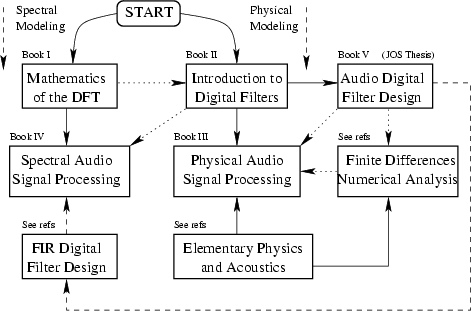Next |
Prev |
Up |
Top
|
Index |
JOS Index |
JOS Pubs |
JOS Home |
Search
This book is the third in my music signal processing
series,
after [422] and [426]. The books in the series can be loosely summarized
by the following ``design goals'':
- Mathematics of the Discrete Fourier Transform
All about the DFT formula and its constituents, with frequent
references to audio applications.
- Introduction to Digital Filters
All about ``small'' (mostly first and second order) digital filters used in
audio applications, and the elementary concepts of linear systems theory.
- Physical Audio Signal Processing
Efficient computational physical models
for delay effects and virtual acoustic musical instruments.
- Spectral Audio Signal Processing
Analysis, processing, and synthesis of audio signals
in terms of spectral representations computed using the Fast
Fourier Transform (FFT).
Figure 1 illustrates the dependencies. A solid line
indicates a strong dependence, while a dotted line indicates a much
weaker (optional) dependence.
Figure 1:
Schematic of
interdependencies in the music signal processing book series, along
with some closely related topics.
 |
The books were originally designed for a two-year course sequence in
signal processing applied to music and audio (semester system
preferred).
The student is expected to pick up elementary physics
[169] and programming skills
[421,79] elsewhere. In all books, the main
chapters contain approximately what is covered in class, while the
appendices provide both elementary background material and additional
advanced topics.
Next |
Prev |
Up |
Top
|
Index |
JOS Index |
JOS Pubs |
JOS Home |
Search
[How to cite and copy this work]

